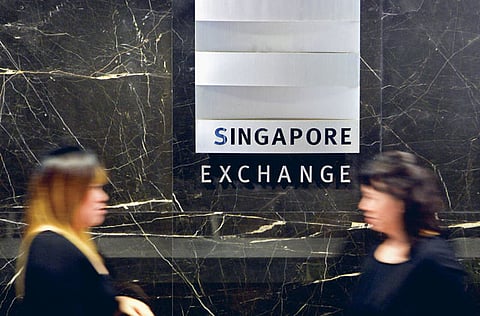Eurozone troubles batter stocks
Yen's new 15-year high hits nikkei doubly hard amid declines in Asia and Europe

Singapore: Asian stocks fell Wednesday, led by shares in Japan's big exporters as a rise in the yen to a new 15-year high threatened to erode their overseas earnings.
Major European stock markets followed Asia lower and the euro was on the defensive, after renewed fears about the eurozone banking system drove the single currency to life lows against the Swiss franc and Australian dollar and hurt financial stocks.
"I think we can still see some skeletons in the closet in the European banking sector," said David Cohen, an economist at Action Economics in Singapore.
Japan's Nikkei fell 2.2 per cent, with major exporters prominent among the decliners. Electronics parts makers Kyocera and TDK both fell more than 3 per cent and chip-tester maker Advantest lost 4.4 per cent.
"With the yen's advance accelerating and worries about credit risks in Europe heightening, the market is pressured by investor concern about risk-taking," said Kazuhiro Takahashi, general manager at Daiwa Securities Capital Markets.
MSCI's broadest index of Asia-Pacific shares outside Japan eased 0.5 per cent.
Britain's FTSE 100 fell 0.5 per cent at the opening and Germany's Dax and France's CAC 40 both lost 0.3 per cent. The FTSEurofirst 300 of leading regional shares eased 0.1 per cent before edging back into positive territory.
US S&P 500 futures were marginally higher.
Worries about Europe's banks resurfaced on Tuesday, when the Wall Street Journal reported that some major lenders had understated holdings in potentially risky government debt during "stress tests" designed to test their ability to weather crises.
Ireland added to the jittery mood, extending its guarantees for short-term bank liabilities amid fears over the escalating cost of bailing out nationalised lender Anglo Irish.
The dollar fell to its lowest since 1995 against the yen as traders probed for options barriers below 83.50 yen and tested the Japanese authorities' pain threshold for currency strength, seen as a serious block on recovery for the export-driven economy.
"The only source of strength in the Japanese economy is exports," said Michael Hasenstab, Franklin Templeton's co-director of international bonds, arguing more quantitative easing steps by Japan were possible and could weaken the yen.
"And with the yen sub-90, they [policymakers] will be under extreme pressure" to act, he told the Reuters Dealing Room online chatroom.
Bank of Japan Governor Masaaki Shirakawa reiterated yesterday his reluctance to return to quantitative easing, but indicated the central bank was weighing its options on how to deal with the economic impact of the surging yen.
The dollar dipped as far as 83.34 yen down 0.5 per cent on the day. The euro also fell 0.5 per cent to 105.83 yen and was threatening to revisit August's nine-year low just below 105.50.
The euro was pinned at $1.2720 having dived from $1.2870 on Tuesday and a three-week high of $1.2920 the day before.
Sign up for the Daily Briefing
Get the latest news and updates straight to your inbox



